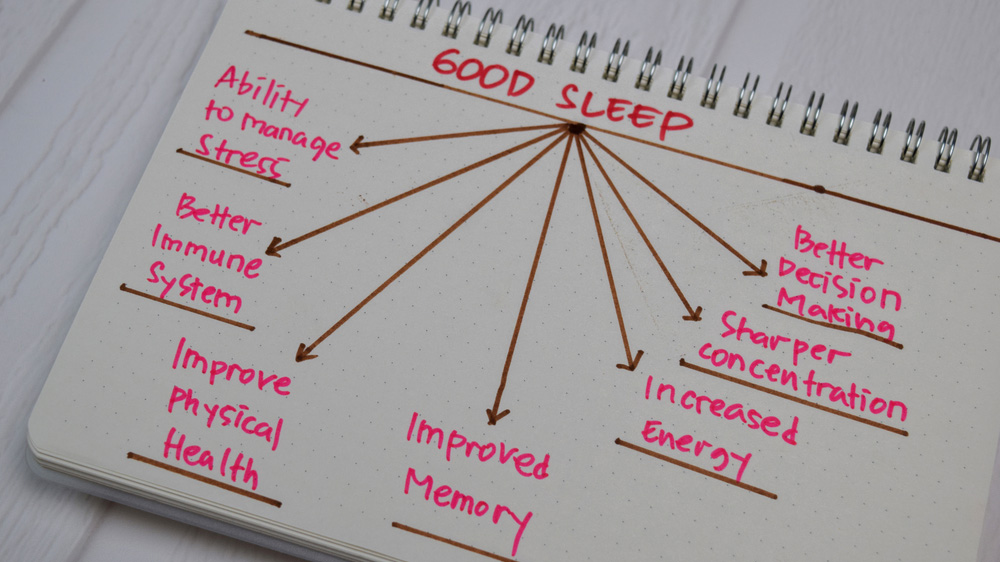We will talk about how Sleep reinforces immune system. They are more connected than you might think. Beyond offering restful dreams and much-needed rest, sleep plays a vital role in our health and well-being. Numerous studies now show that the hours we spend in bed have a direct impact on our immune defenses. Yes, a good night’s sleep strengthens our immune system, helping us fight viruses and harmful microbes. So, why not make sleep one of our best allies? Let’s explore how it boosts our defenses and supports overall health.
Sleep: An Underrated Pillar of Health
Sleep is essential for our bodies, far beyond mere comfort. It’s a complex process during which the body repairs, regenerates, and prepares for the challenges of the next day. Sleep is also closely linked to the proper functioning of the immune system, which acts as our shield against infections and diseases.
Our immune system relies heavily on the body’s ability to produce and regulate white blood cells, cytokines, and other immune cells. During sleep, these elements regenerate and strengthen, making the body better equipped to respond effectively to pathogens. Studies show that poor or insufficient sleep lowers the production of these cells and increases chronic inflammation, which promotes infections and delays recovery.
The Role of Deep Sleep in Antibody Production
Among the different sleep phases, deep sleep—also known as slow-wave sleep—is the most beneficial for the immune system. During this phase, the body releases more growth hormones, which play a key role in tissue repair and immune system strengthening. In fact, deep sleep is when T lymphocytes, essential immune defense cells, become most active. These cells directly target and destroy virus- or bacteria-infected cells, and their effectiveness depends on the quality of our deep sleep.
A good night’s sleep also improves our response to vaccinations. When well-rested, the body produces more antibodies in response to a vaccine, strengthening immunity. Conversely, disrupted sleep reduces vaccine efficacy—an observation that’s particularly relevant in times when vaccination is crucial to controlling infectious diseases.
How Sleep Deprivation Weakens the Immune System
Insufficient or irregular sleep leads to a significant decline in immune responses. Chronic sleep deprivation—defined as consistently getting less than six hours per night—raises cortisol levels, the stress hormone, which weakens immune cells and increases the risk of inflammatory and infectious diseases.
Studies show that people who sleep less than six hours per night are four times more likely to get sick when exposed to a virus compared to those who sleep at least eight hours. This weakening of immunity isn’t just about temporary fatigue; it creates long-term vulnerability because the body can’t effectively regenerate its defense cells or reduce inflammation.
Sleep: A Natural Ally Against Inflammation
Cytokines, proteins that regulate inflammation and immunity, are produced in higher quantities during sleep. When sleep is insufficient, the production of these proteins decreases, depriving the body of a key defense against infections. An inadequate amount of anti-inflammatory cytokines leads to chronic inflammation, which can worsen conditions like diabetes, heart disease, and even some cancers.
Chronic inflammation disrupts the balance of the immune system, making it more susceptible to infections. It can also trigger autoimmune disorders, where the body attacks its own cells. In other words, sleep acts as a firefighter, regulating inflammation and preventing it from spreading throughout the body.
Improving Sleep to Strengthen Immunity
How can you maximize the benefits of sleep for your immune system? Here are a few simple habits that can make a difference:
- Stick to a Regular Sleep Schedule: The body thrives on routine. Going to bed and waking up at the same time each day helps regulate hormones, essential for effective immune responses.
- Create a Sleep-Friendly Environment: A quiet, dark, and cool room optimizes deep sleep. Reducing screen time at least an hour before bed also helps, as blue light interferes with melatonin production, the sleep hormone.
- Avoid Caffeine and Alcohol in the Evening: These substances disrupt sleep and reduce the restorative benefits of deep sleep.
- Exercise Regularly: Physical activity improves sleep quality and, by extension, strengthens immunity. Just avoid intense workouts right before bed.
- Practice Relaxation Techniques: Meditation, deep breathing, and even a warm bath can help prepare the body and mind for restorative sleep.
Sleep: An Accessible Preventative Weapon
As we’ve seen, sleep is a central pillar of our health. It’s a natural, free, and accessible ally to strengthen the immune system. Restful nights not only help you feel more energetic but also boost your ability to resist infections and inflammatory diseases. By establishing a regular sleep routine and incorporating habits that promote restorative rest, you can optimize your long-term health. Through this step the sleep reinforces immune system.
The next time you’re debating whether to extend your night’s sleep, remember that every extra hour under the covers helps build a more resilient immune system. It might just be the best “disease prevention” cure you could ever dream of! , now you understand why sleep reinforces immune system.
Sources :
- National Institutes of Health (NIH) – Sleep and immune function
- Centers for Disease Control and Prevention (CDC) – Sleep’s role in disease prevention
- Harvard Medical School – How sleep boosts immune system
- Sleep Foundation – The relationship between sleep and immunity
- American Psychological Association (APA) – Sleep, stress, and immunity


